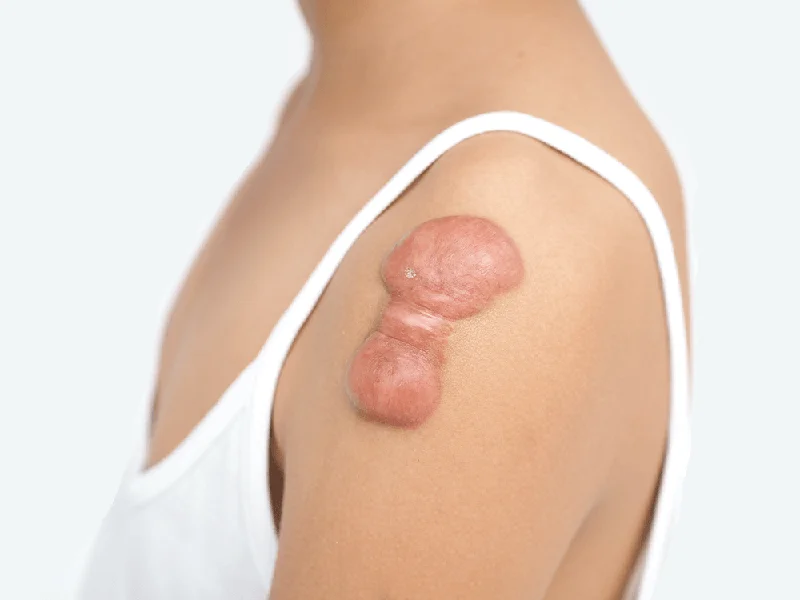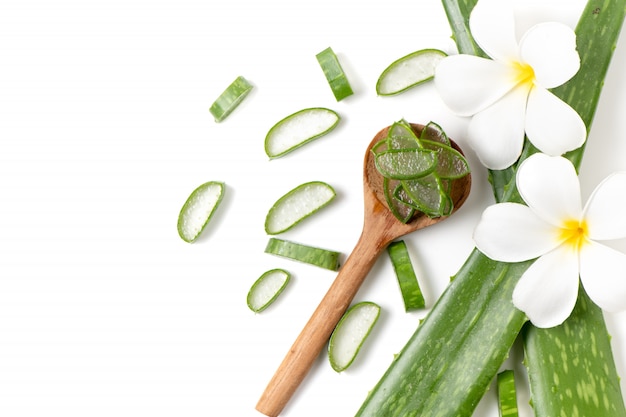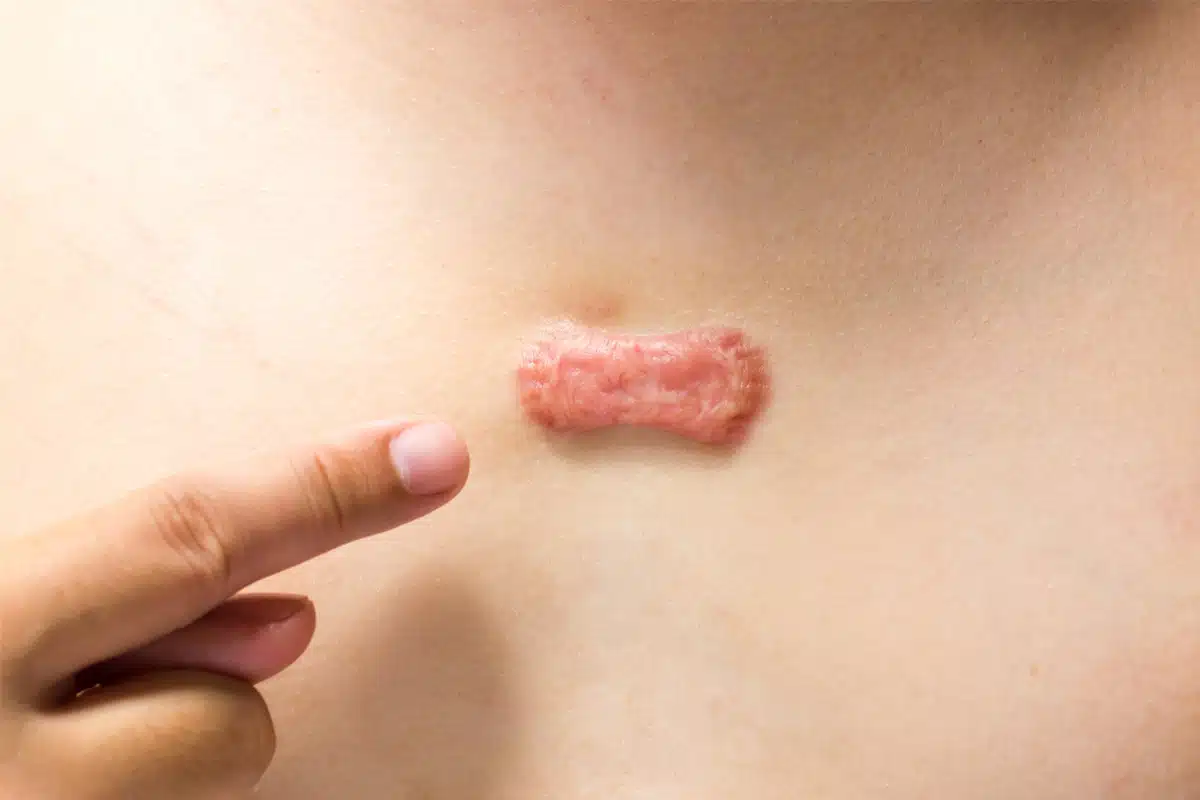Ask Ayurvedic doctor a question and get a consultation online on the problem of your concern in a free or paid mode. More than 2,000 experienced doctors work and wait for your questions on our site and help users to solve their health problems every day.
Keloid Treatment in Ayurveda – Natural Healing Approaches

Introduction to Keloid Treatment in Ayurveda
Keloids are overgrown scars that develop at the site of an injury, causing discomfort and aesthetic concerns. While conventional treatments may not always provide lasting relief, Ayurvedic treatments offer a natural, holistic approach to managing keloids. By focusing on the internal balance of the body, Ayurveda uses a combination of herbs, oils, and treatments to help reduce the size of keloids, prevent further growth, and promote skin healing.
In Ayurveda, the treatment of keloids is based on the principle of balancing the doshas (Vata, Pitta, and Kapha) and removing toxins (Ama) from the body. Natural remedies aim to nourish the skin, improve circulation, and accelerate tissue regeneration. This comprehensive approach helps to manage keloid scars effectively, promoting healing and restoring skin health.
Don't wait or self medicate. Start chat with Doctor NOW
Historical Roots & Ayurvedic Significance
The practice of treating scars and skin conditions using herbal remedies dates back thousands of years in Ayurveda. Ancient Ayurvedic texts mention the importance of proper wound healing and the use of specific herbs to manage scars, including keloids. Traditionally, Ayurvedic practitioners believed that excess Pitta and Kapha doshas contributed to the formation of keloids, and treatments aimed to balance these energies while nourishing the skin.
The use of natural oils, such as coconut oil, sesame oil, and herbal pastes, has been integral in Ayurvedic skin care. These oils are believed to have anti-inflammatory, healing, and skin-regenerating properties, making them effective in treating keloids and other skin conditions.
Key Ayurvedic Components for Keloid Treatment
1. Herbal Ingredients
Ayurvedic remedies for keloid treatment include several herbs known for their ability to reduce inflammation, support skin healing, and enhance circulation:
- Neem (Azadirachta indica): Known for its antimicrobial and anti-inflammatory properties, neem helps to soothe irritated skin and reduce redness and swelling associated with keloids.
- Turmeric (Curcuma longa): This herb has potent anti-inflammatory and antioxidant properties, which can help in the healing process and prevent further scar formation.
- Aloe Vera (Aloe barbadensis): Aloe vera is widely recognized for its skin-soothing effects and ability to promote tissue regeneration, aiding in the softening of keloid scars.
- Gotu Kola (Centella Asiatica): Known for its role in promoting collagen synthesis, Gotu Kola helps in wound healing and can improve the appearance of scars.
- Saffron (Crocus sativus): Saffron is often used in Ayurvedic skin care for its ability to lighten skin and reduce the appearance of scars.
2. Ayurvedic Oils and Pastes
Ayurvedic oils play a significant role in treating keloids. The oils are used for their ability to penetrate deep into the skin, nourish tissues, and promote healing. Popular oils for treating keloids include:
- Coconut Oil: Known for its moisturizing properties, coconut oil helps to keep the skin hydrated and supports healing.
- Sesame Oil: Rich in antioxidants, sesame oil helps to calm inflammation and speed up skin regeneration.
- Rosemary Oil: Rosemary oil is often used to promote blood circulation, which aids in the healing of scar tissue.
3. Diet and Detoxification
In Ayurveda, maintaining a balanced diet is essential for promoting healthy skin and preventing excessive scar tissue formation. It is recommended to avoid excessive consumption of spicy, greasy, and heavy foods that can increase Pitta dosha. Instead, focus on a diet that supports Vata and Kapha balance, which includes fresh fruits, vegetables, and foods that are rich in antioxidants and omega fatty acids.
Detoxification through Ayurvedic herbs like Triphala and Amalaki can help cleanse the body, remove toxins, and reduce the risk of keloid formation. Detoxifying therapies like Panchakarma are also often recommended to clear accumulated toxins from the body and promote overall skin health.
How Keloid Treatment Works in Ayurveda: The Healing Mechanism
Ayurvedic treatments work by addressing the root causes of keloid formation—imbalance in the body's doshas and the accumulation of toxins. Herbal treatments target the inflammatory pathways in the skin, reduce excess scar tissue production, and stimulate collagen production to aid in healing. Additionally, the use of nourishing oils helps to soften hardened scar tissue and improve skin elasticity.
Ayurvedic treatments also emphasize the importance of maintaining a calm, stress-free lifestyle, as emotional stress can contribute to imbalances in Pitta dosha, potentially exacerbating skin conditions such as keloids.
Choosing the Right Ayurvedic Treatment for Keloids
When considering Ayurvedic treatment for keloids, it's important to consult with a certified Ayurvedic practitioner to ensure that the treatment plan is tailored to your body type (Prakriti) and the specific condition of the keloids. Additionally, it's crucial to choose high-quality, organic herbal products to ensure maximum effectiveness.
Here are a few tips for selecting the right Ayurvedic remedies:
- Consult with Professionals: Seek the advice of a qualified Ayurvedic practitioner for personalized recommendations based on your unique body constitution and health needs.
- Choose Organic, Authentic Products: To ensure the effectiveness and safety of the treatment, always opt for organic and certified Ayurvedic products from trusted sources.
- Consistency is Key: Ayurvedic treatments require time and consistency. It's important to follow the recommended routine and be patient with the healing process.
Recommended Ayurvedic Practices for Keloid Treatment
- Apply Herbal Oils and Pastes: Gently massage oils such as coconut or sesame oil into the affected area daily to improve circulation and reduce scar tissue formation.
- Take Herbal Supplements: Consider taking Ayurvedic supplements like Gotu Kola or Triphala to support skin health from within.
- Practice Detoxification: Engage in regular detoxification practices, such as Panchakarma, to cleanse the body of toxins and support healthy skin regeneration.
- Follow a Pitta-Calming Diet: Consume foods that balance Pitta dosha, such as cooling, fresh, and non-spicy foods, to promote overall skin health.
Potential Side Effects & Precautions
While Ayurvedic treatments for keloids are generally safe, there are a few precautions to keep in mind:
- Allergic Reactions: Some individuals may be allergic to specific herbs or oils. Always perform a patch test before using any new product on your skin.
- Pregnancy & Nursing: Pregnant or nursing women should consult a practitioner before using certain herbs or oils.
- Consultation: Always consult an Ayurvedic practitioner to ensure that the treatment is suitable for your specific needs.
Frequently Asked Questions for Keloid Treatment in Ayurveda
How does Ayurveda treat keloids?
Ayurveda treats keloids by addressing the underlying dosha imbalances, using herbal remedies and oils that reduce inflammation, promote healing, and prevent excessive scar tissue formation. The goal is to balance the body's internal energies and restore skin health naturally.
What are the most effective herbs for treating keloids in Ayurveda?
Effective herbs for treating keloids include Neem, Turmeric, Aloe Vera, Gotu Kola, and Saffron. These herbs have anti-inflammatory, antimicrobial, and healing properties that help to reduce scar formation and improve skin health.
Can Ayurvedic oils help reduce keloids?
Yes, Ayurvedic oils such as Coconut Oil, Sesame Oil, and Rosemary Oil are beneficial for treating keloids. They help to soothe the skin, reduce inflammation, and promote the regeneration of healthy tissue, leading to softer, less noticeable scars.
Are there any dietary recommendations for preventing keloid formation?
Ayurveda recommends a diet that balances Vata and Kapha doshas. Avoid spicy, greasy, and heavy foods that can aggravate Pitta dosha. Focus on consuming fresh fruits, vegetables, and foods rich in antioxidants to promote healthy skin.
How long does it take to see results from Ayurvedic keloid treatments?
Results vary depending on the severity of the keloid and the consistency of treatment. Typically, it may take a few weeks to months for noticeable improvements in the appearance and size of keloids. Patience and regular application are key.
Can Ayurvedic treatments be combined with conventional keloid treatments?
Yes, Ayurvedic treatments can be used alongside conventional treatments for keloids. However, it is important to consult with both an Ayurvedic practitioner and a medical professional to ensure that the treatments are complementary and not conflicting.
Where can I find authentic Ayurvedic products for keloid treatment?
Authentic Ayurvedic products can be sourced from reputable Ayurvedic pharmacies, certified practitioners, or trusted online stores specializing in Ayurvedic remedies. Ensure that the products are organic and free from synthetic additives for maximum effectiveness.
Conclusion & Expert Insights
Keloid treatment in Ayurveda offers a natural, holistic approach to managing scar tissue. By using a combination of potent herbs, oils, and detoxification practices, Ayurveda helps to balance the body's internal energies, promote skin healing, and reduce the appearance of keloids. Consulting with a qualified Ayurvedic practitioner and following a consistent regimen can lead to effective and lasting results, offering a gentle and natural alternative to conventional scar treatments.
References & Further Reading
- Lad, V. (2002). Ayurveda: The Science of Self-Healing.
- Sharma, P.V. (1995). Ayurvedic Healing: A Comprehensive Guide.
- Journal of Ayurveda and Integrative Medicine for studies on Ayurvedic skincare and wound healing.



